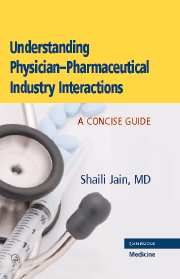Book contents
- Frontmatter
- Contents
- Acknowledgments
- Foreword
- Introduction
- 1 Gifts from the Pharmaceutical Industry to Physicians: Do They Influence your Prescribing?
- 2 Ethical Considerations of Receiving Gifts from the Pharmaceutical Industry
- 3 One on One: An Analysis of the Physician–Pharmaceutical Company Representative (PCR) Detailing Interaction
- 4 Medical Academia and the Pharmaceutical Industry
- 5 Teaching Physicians in Training about Pharmaceutical Industry Promotion
- 6 Continuing Medical Education: How to Separate Continuing Medical Education from Pharmaceutical Industry Promotion
- 7 Professional Policies on Physician–Pharmaceutical Industry Interaction (PPII)
- 8 Preserving Professionalism: Patients' Perceptions of Physicians' Acceptance of Gifts from the Pharmaceutical Industry
- 9 To Sample or Not to Sample? The Use of Pharmaceutical Industry–Supplied Medications in Medical Practice
- 10 Physician–Pharmaceutical Industry Interactions (PPIIs), the Law and the Media
- 11 Direct-to-Consumer Advertising (DTCA)
- 12 Pharmaceutical Industry Interactions with Health Care Professionals: A Global Perspective
- 13 Internet Resources for Teaching about PPII and Independent Sources of Information about Prescription Medicines
- Appendix I
- Appendix II
- Index
13 - Internet Resources for Teaching about PPII and Independent Sources of Information about Prescription Medicines
Published online by Cambridge University Press: 03 March 2010
- Frontmatter
- Contents
- Acknowledgments
- Foreword
- Introduction
- 1 Gifts from the Pharmaceutical Industry to Physicians: Do They Influence your Prescribing?
- 2 Ethical Considerations of Receiving Gifts from the Pharmaceutical Industry
- 3 One on One: An Analysis of the Physician–Pharmaceutical Company Representative (PCR) Detailing Interaction
- 4 Medical Academia and the Pharmaceutical Industry
- 5 Teaching Physicians in Training about Pharmaceutical Industry Promotion
- 6 Continuing Medical Education: How to Separate Continuing Medical Education from Pharmaceutical Industry Promotion
- 7 Professional Policies on Physician–Pharmaceutical Industry Interaction (PPII)
- 8 Preserving Professionalism: Patients' Perceptions of Physicians' Acceptance of Gifts from the Pharmaceutical Industry
- 9 To Sample or Not to Sample? The Use of Pharmaceutical Industry–Supplied Medications in Medical Practice
- 10 Physician–Pharmaceutical Industry Interactions (PPIIs), the Law and the Media
- 11 Direct-to-Consumer Advertising (DTCA)
- 12 Pharmaceutical Industry Interactions with Health Care Professionals: A Global Perspective
- 13 Internet Resources for Teaching about PPII and Independent Sources of Information about Prescription Medicines
- Appendix I
- Appendix II
- Index
Summary
There are many helpful Internet resources for teaching physicians about PPII. No Free Lunch (http://www.nofreelunch.org, last accessed June 2006) is a website run by health care providers who believe that “pharmaceutical promotion should not guide clinical practice and that over zealous promotional practices can lead to bad patient care.” It receives no external funding.
The impetus for the World Health Organization (WHO)/Non-Governmental Organizations (NGO) Drug Promotion Database started in May 1999 at the WHO/Public Interest NGO Roundtable on Pharmaceuticals. This website (www.drugpromo.info, last accessed June 2006) is coordinated by WHO's Department of Essential Drugs and Medicines Policy and Health Action International Europe. It has input from health care professionals globally. The website systematically documents evidence for various types of pharmaceutical promotion on physicians and critically reviews the research in this area.
The American Medical Association's AMA Virtual Mentor is the online ethics and professionalism journal of the AMA. Its mission is to “promote the ethical and professional development of tomorrow's physicians.” In July 2003 it published an issue on medicine and industry that can be accessed at www.ama-assn.org/ama/pub/category/10812.html (last accessed June 2006).
The American Medical Students Association (AMSA) PharmFree campaign started in 2002 in collaboration with No Free Lunch (www.amsa.org/prof/pharmfree.cfm, last accessed June 2006) and could be a useful source of discussion for medical student curricula.
The Medical Letter is a nonprofit organization founded in 1958 (www.medicalletter.org, last accessed June 2006). It is completely independent, supported solely by fees, and accepts no advertising, grants or donations.
- Type
- Chapter
- Information
- Understanding Physician-Pharmaceutical Industry InteractionsA Concise Guide, pp. 68 - 70Publisher: Cambridge University PressPrint publication year: 2007



